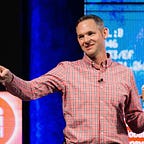How Larry Ellison might have predicted the future and other pandemic pivots
It was a little surprising when Larry Ellison told me in early 2019 to pivot the startup program to 100% virtual. That directive seems prescient now.
A little history: When the startup program started in 2017, we had co-working facilities in locations across the globe. We believed the co-working spaces were a strong benefit of the program — the data proved we were wrong. In the aggregate, our nine facilities sat at around 20% occupancy. Although the startups were actively engaged with the program, they simply didn’t need a physical space to work. That wasn’t of value. They already had offices, worked from co-working facilities, or worked from home. Brick and mortar was a beautiful offering in theory, but in practice impeded our ability to support more than a handful startups at a time.
What mattered most to the startups was more access to cloud technology, customer connections and marketing exposure. They wanted to scale their businesses and needed Oracle’s technology and business resources to do so. In fact, we did a small experiment with a virtual program in 2018 to see if that was true. It was.
So, during that pivotal meeting, Larry told us to shutter the physical centers and reinvest the savings into more valuable resources for the startups. He granted startups in the program a 70% discount on all infrastructure and PaaS services for two years. At that point, Larry tapped Mamei Sun, his chief of staff, to lead us to do the hard work of transformation. We doubled-down on our resources to enable customer introductions, migration assistance and marketing exposure. And we began to accelerate our virtual resources and build out our online startup portal.
Today, Oracle for Startups works with thousands of startups across the globe. All virtually. Certainly, our virtual headstart made the transition during COVID-19 a bit easier. However, just like everyone else, the pandemic has impacted us. From pressing down on digital efforts to fast-tracking new ideas, we are trying to reimagine relationships through this new pandemic paradigm.
Below are six key lessons we have learned:
Digital Transformation Can Be Accelerated: In the pandemic, all timelines are compressed. And that’s testing our limits. What we once projected to take four to six months is now getting completed in two. Take, for example, our online portal that gives the startups on-demand access to a variety of resources from additional credits to migration assistance to customer connections. Our product roadmap has been accelerated and we are rolling out new features like Venture Capital Connect and a Virtual Library ahead of schedule. We can iterate and operate faster now — successfully. Something we learned because we were tested. Out of problems, come solutions.
Startups Want Hands-on Migration Support: If this pandemic has done anything, it’s shown the importance of having flexible, elastic and rock-solid infrastructure. Whether you had to scale up to keep up with customer demand, or scale down to weather the storm, elasticity is key to adapt and survive. Our program offers free migration assistance to startups, something that’s been on the rise since the pandemic. Startups need resources now and our tech experts are stepping in to help. We’ll continue to double-down on our migration assistance, offering more hands-on help to startups who want to future-proof their technology.
Experiment with Storytelling: Audio is the new black. Look no further than podcast popularity. To seize on that, our team rolled out a new audio storytelling feature that’s short and sweet — only 120 seconds. The new “Meet the Startups” audio shorts allows us to highlight and amplify a startup’s story in a quick and engaging audio format. We’re experimenting with how we tell our stories and will continue to test and learn: Check it out on Soundcloud.
Webinar Fatigue is a Thing: Yep, it’s real. And our team is fighting it by stretching our creative limits and trying new things. We hosted a “Startup Idol” webinar for global analysts that pitted six startups in a pitch competition allowing the analysts to engage and vote. The response was positive noting it was “unique” and “engaging and fun” in a sea of sameness. We are also conducting “Meet the Startups” roundtable webinars, giving customers and partners insights into startup solutions for their particular industries. And we’re tackling diversity and inclusion head-on with webinars like, “The F Word: Females, Funding, Future.” Testing and learning. Keeping things fresh. Check out what’s coming and what’s on-demand for our webinars.
Humanity and Respect Priority №1: 2020 has been hard. Every person is experiencing it in their own unique way. Humanity has to come first. Whether helping startups with financial aid or offering virtual outlets for our team, we are putting on a focus on people and relationships. We’re trying new things, connecting on a human level. Our new team-wide competition we call “House Cup” (think Harry Potter) has been really inspiring and fun. We are also learning to respect each person’s unique working patterns and schedules, and some of us have some really unique ones. When you make respect and relationships priority №1, everything else will fall into place. We already knew that. 2020 has helped bring it back into focus.
The predictions that I made at the beginning of 2020 didn’t exactly predict a global pandemic, but we had some foresight of our own. Our ethos is to constantly test, learn and iterate. Doing so helps us better prepare for the future — whatever that might be. And, of course, a bit of future gazing from Larry always helps.
Learn more about Oracle for Startups.
